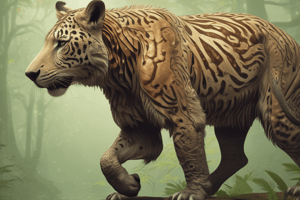Podcast
Questions and Answers
What is the primary focus of entomology?
What is the primary focus of entomology?
- Study of reptiles and amphibians
- Study of mammals
- Study of insects (correct)
- Study of fish
Which branch of zoology would likely study fish behavior?
Which branch of zoology would likely study fish behavior?
- Ornithology
- Mammalogy
- Herpetology
- Ichthyology (correct)
What is the significance of taxonomy in zoology?
What is the significance of taxonomy in zoology?
- It focuses on animal genetics and DNA analysis.
- It classifies animals into hierarchical groups. (correct)
- It examines animal behavior in relation to climate change.
- It studies animal movement and migration patterns.
Which of the following techniques focuses on observational research in natural habitats?
Which of the following techniques focuses on observational research in natural habitats?
What is one of the major threats to wildlife mentioned in zoology?
What is one of the major threats to wildlife mentioned in zoology?
Which branch of zoology specializes in the study of birds?
Which branch of zoology specializes in the study of birds?
What ethical consideration is important in zoological research?
What ethical consideration is important in zoological research?
Which career focuses on managing and advocating for wildlife conservation efforts?
Which career focuses on managing and advocating for wildlife conservation efforts?
Flashcards are hidden until you start studying
Study Notes
Overview of Zoology
- Zoology: The scientific study of animals, covering their biology, behavior, evolution, and interactions with ecosystems.
- Importance: Understanding animal physiology, ecology, and evolution is vital for conservation, biodiversity, and human health.
Major Branches of Zoology
- Entomology: Study of insects; focuses on their behavior, taxonomy, and ecology.
- Ichthyology: Study of fish; encompasses their physiology, classification, and conservation.
- Ornithology: Study of birds; includes aspects of behavior, migration, and anatomy.
- Mammalogy: Study of mammals; explores their evolution, classification, and conservation.
- Herpetology: Study of reptiles and amphibians; investigates their habitats, behavior, and physiology.
- Marine Biology: Focuses on animal life in saltwater environments; includes study of marine ecosystems and species.
- Aves: Focus on birds, exploring anatomy, physiology, and the ecology of flight.
Key Concepts in Zoology
- Taxonomy: Classification of animals into hierarchical groups (Domain, Kingdom, Phylum, Class, Order, Family, Genus, Species).
- Evolution: The process through which species adapt and evolve over time via natural selection.
- Anatomy and Physiology: Study of structural organization and functions of animals.
- Behavioral Zoology: Examines animal behavior in response to their environment, social structures, and mating rituals.
Techniques and Tools
- Field Studies: Observational research conducted in natural habitats.
- Laboratory Research: Controlled experiments to study animal physiology and genetics.
- Molecular Techniques: Use of DNA and RNA analysis for species identification and evolutionary studies.
- Bioinformatics: Application of computer science to analyze biological data, particularly in genomics.
Conservation and Environmental Impact
- Biodiversity: Importance of genetic, species, and ecosystem diversity for ecological balance.
- Threats to Wildlife: Habitat destruction, climate change, pollution, and exploitation threaten animal populations.
- Conservation Efforts: Involvement of zoologists in wildlife management, habitat restoration, and policy advocacy.
Career Opportunities in Zoology
- Research Scientist
- Wildlife Biologist
- Conservation Officer
- Educator and Outreach Specialist
- Zoo and Aquarium Curator
Ethical Considerations
- Ethical treatment of animals in research and captivity.
- Understanding the impact of human activity on wildlife.
- Promoting conservation and responsible stewardship of ecosystems.
Overview of Zoology
- Zoology is the scientific study of animals, encompassing all aspects of their biology, behavior, evolution, and interactions with ecosystems.
- Understanding animal life is crucial for conservation efforts, promoting biodiversity, and ensuring human health.
Major Branches of Zoology
- Entomology focuses on the study of insects, including their behavior, classification, and the role they play in ecosystems.
- Ichthyology is dedicated to understanding fish, encompassing their physiology, classification, and conservation needs.
- Ornithology explores the world of birds, investigating their behavior, migration patterns, and anatomical adaptations.
- Mammalogy delves into the study of mammals, examining their evolution, classification, and the challenges they face in a changing world.
- Herpetology focuses on reptiles and amphibians, investigating their habitats, behavior, and specific adaptations.
- Marine Biology is dedicated to understanding the diverse animal life found in saltwater environments, including studying marine ecosystems and the species they support.
- Aves specifically focuses on birds, exploring the anatomy, physiology, and the ecology of flight.
Key Concepts in Zoology
- Taxonomy is the systematic classification of animals into hierarchical groups, from Domain to Species.
- Evolution, driven by natural selection, explains the gradual change and adaptation of species over time.
- Anatomy and Physiology explore the structural organization and functions of animals, providing insights into their adaptations and survival strategies.
- Behavioral Zoology investigates animal behavior, analyzing their responses to environmental cues, social structures, and mating rituals.
Techniques and Tools
- Field Studies are observational research conducted in natural habitats, providing valuable data on animal behavior and ecology.
- Laboratory Research involves controlled experiments, allowing for in-depth study of animal physiology, genetics, and responses to various stimuli.
- Molecular Techniques utilize DNA and RNA analysis for species identification, evolutionary studies, and understanding genetic relationships.
- Bioinformatics applies computer science to analyze biological data, particularly genomics, allowing for deeper understanding of animal evolution and function.
Conservation and Environmental Impact
- Biodiversity refers to the variety of life on Earth, encompassing genetic, species, and ecosystem diversity, which is essential for balanced ecosystems.
- Threats to Wildlife include habitat destruction, climate change, pollution, and exploitation, all of which significantly impact animal populations.
- Conservation Efforts involve zoologists in wildlife management, habitat restoration, and policy advocacy for the protection of endangered species and ecosystems.
Career Opportunities in Zoology
- Research Scientist
- Wildlife Biologist
- Conservation Officer
- Educator and Outreach Specialist
- Zoo and Aquarium Curator
Ethical Considerations
- Ethical treatment of animals in research and captivity is paramount, ensuring their wellbeing and minimizing harm.
- Understanding the impact of human activity on wildlife is essential for developing sustainable practices.
- Promoting conservation and responsible stewardship of ecosystems is crucial for the long-term survival of animal populations.
Studying That Suits You
Use AI to generate personalized quizzes and flashcards to suit your learning preferences.




